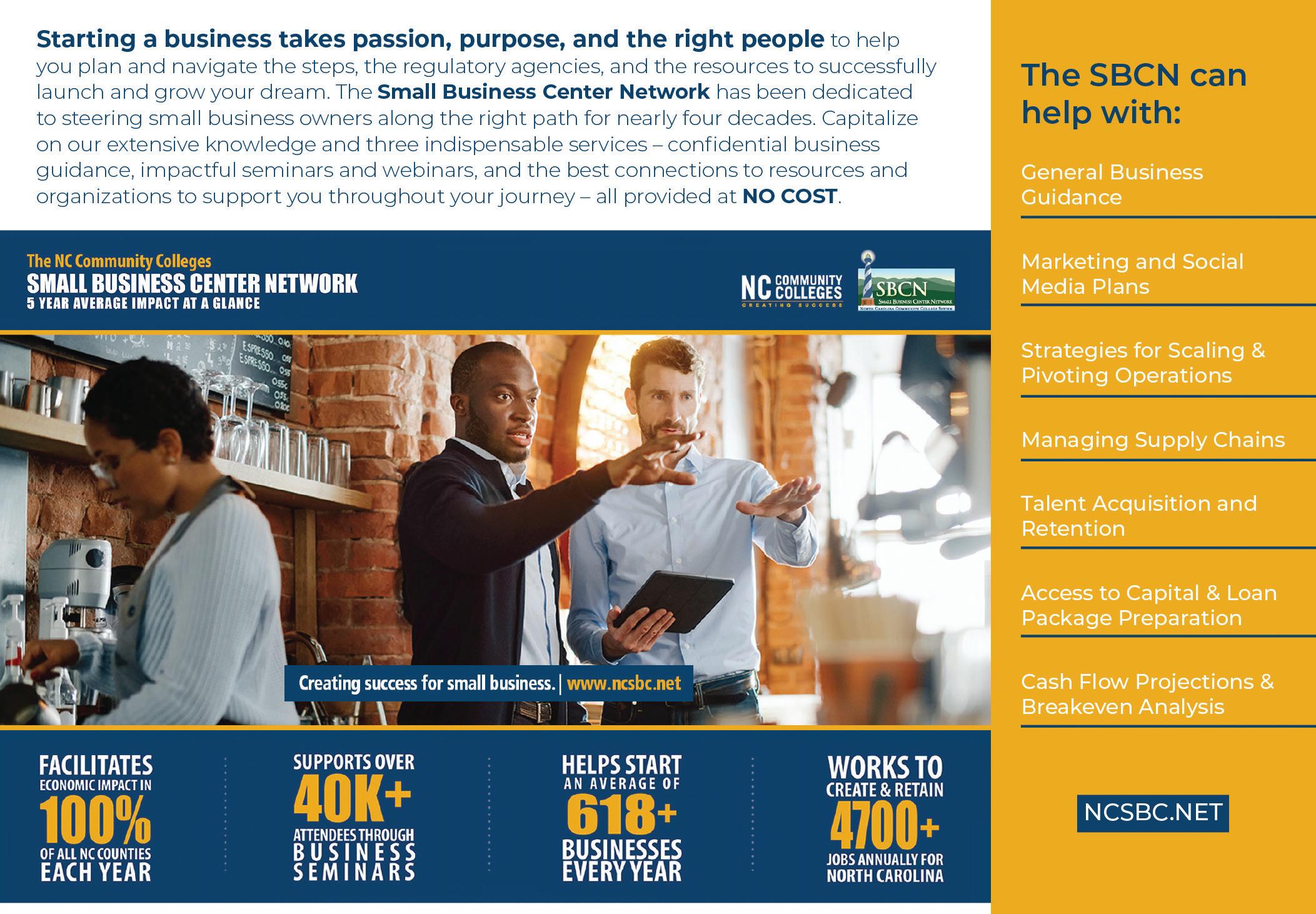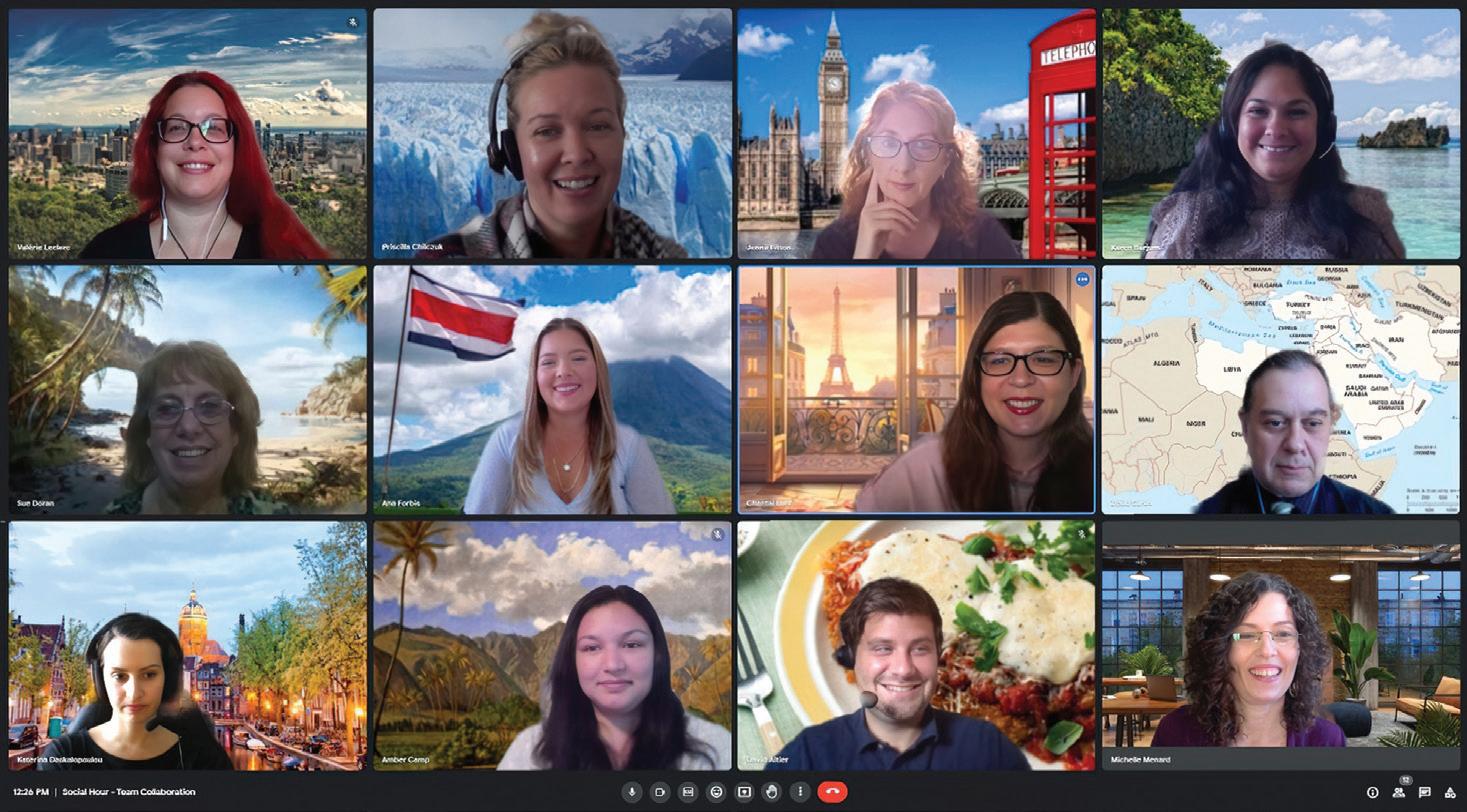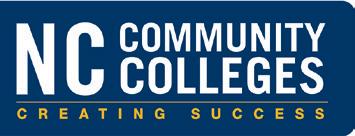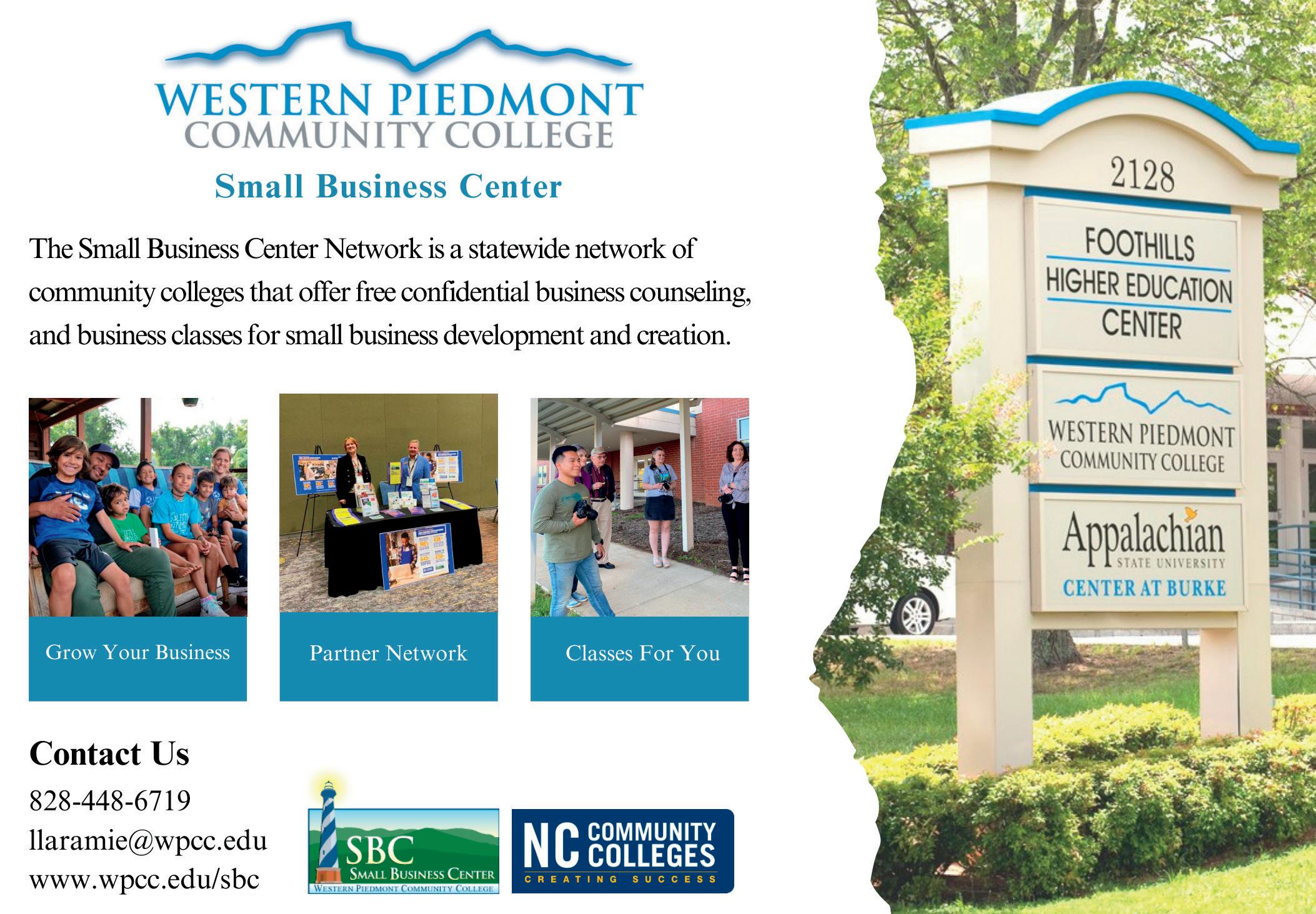FACE TO FACE
Black Mountain’s Everyday Oil reflects North Carolina’s status as a primo launching pad for new companies.

SPONSORED BY Powering Business

THANK YOU TO THE 2023 SPONSORS
PLATINUM SPONSOR:

Duke Energy
GOLD SPONSOR:
Economic Development Partnership of North Carolina
SILVER SPONSORS:
Small Business Technology and Development Center
N.C. Community College System
NC Bankers Association
Western Piedmont Community College
BRONZE SPONSORS:
NC Rural Center
North State Bank
PLATINUM SPONSOR COMMENTS
Duke Energy Business Savings Store
Energy efficiency can help increase profitability, so why not improve your business using energy-efficient products? The Duke Energy Business Savings Store offers ways to help you save energy and money with instant rebates on a variety of energy-efficient products for your business.
Visit duke-energy.com/SmallBizDeal
1 2023 NORTH CAROLINA SMALL BUSINESS HANDBOOK
Powering Business
SMALL BUSINESS & TECHNOLOGY DEVELOPMENT CENTER
5 W. Hargett St., Suite 600 Raleigh, NC 27601
STATE DIRECTOR
Byron Hicks
ASSOCIATE STATE DIRECTOR

Lisa Ruckdeschel
PUBLISHER
Ben Kinney
WRITER
Kathy Blake
SPECIAL PROJECTS EDITOR
Katherine Snow Smith
CREATIVE DIRECTOR
Peggy Knaack
GRAPHIC DESIGNER
Cathy Swaney
Small Business Handbook is produced by Old North State Magazines LLC, 1230 West Morehead Street, Suite 308, Charlotte, NC 28208. Telephone 704-523-6987. Fax 704-523-4211. Editorial content provided by the SBTDC. The SBTDC is funded in part through a cooperative agreement with the US Small Business Administration. All opinions, conclusions or recommendations expressed are those of the author(s) and do not necessarily re ect the views of the SBA. All rights reserved. The contents of this publication may not be reproduced by any means, in whole or in part, without prior written consent of Old North State Magazines LLC and the SBTDC.

2 2023 NORTH CAROLINA SMALL BUSINESS HANDBOOK CONTENTS 4 2023 STATE OF SMALL BUSINESS Opening letter from SBTDC State Director Byron Hicks 6 CASE STUDY: FINANCE Goombays Grille & Raw Bar, Kill Devil Hills 9 CASE STUDY: DIGITAL MARKETING Trimm, Inc., Youngsville 12 CASE STUDY: WORKFORCE Choice Translating, Charlotte 15 CASE STUDY: MANAGING GROWTH Everyday Oil, Black Mountain 18 SMALL BUSINESS RESOURCES Small Business & Technology Development Center N.C. Small Business Center Network State Agencies Public & Private Nonprofits


3 2023 NORTH CAROLINA SMALL BUSINESS HANDBOOK
Dear Readers,
We are once again pleased to provide the North Carolina Small Business Handbook. This year’s edition features profiles of successful small businesses, highlights on topical areas of interest, and resources that can help small businesses navigate through business and economic changes.
Small businesses play a crucial role in driving economic growth and development, especially in local communities. From job creation and innovation to community engagement, small businesses are the backbone of the state’s economy and a key reason that North Carolina has been named the “Best State for Business” by CNBC for two years running.
JOB CREATION AND EMPLOYMENT OPPORTUNITIES
Small businesses are the primary source of job creation in North Carolina. According to the Small Business Administration (SBA), small businesses account for 99.6% of all businesses in the state, employing over 1.7 million people in various industries. Over the last 25 years, small businesses have created two-thirds of the net new jobs. These businesses provide opportunities for local residents to find meaningful employment close to home. As small businesses grow and thrive, they create more job openings, driving down unemployment rates and enhancing the overall economic stability of their communities.
ECONOMIC RESILIENCE AND DIVERSITY
In North Carolina, small businesses contribute significantly to the diversification of the state’s economy. Small businesses operate in many sectors, such as agriculture, technology, tourism, manufacturing, and services. This diversity helps support local economies against economic downturns and changes in any one industry. During challenging times, small businesses often demonstrate greater adaptability and resilience, ensuring that North Carolina’s local economies remain strong and less dependent on external factors. This was never more evident than during the last 3 years.
INNOVATION AND ENTREPRENEURSHIP
Small businesses drive innovation and entrepreneurship in North Carolina. Entrepreneurs often identify problems or gaps in the market and introduce innovative products and services. These solutions drive competitiveness and technological advancements. The state’s universities and research institutions also play a vital role in fostering entrepreneurial culture, providing access to knowledge, resources, and mentorship for aspiring business owners. In addition to the universities, the state’s strong community college system supports workforce and talent development. This synergy between higher education and local businesses creates a fertile ground for groundbreaking ideas to take root, driving economic growth and placing North Carolina at the forefront of innovation.
COMMUNITY ENGAGEMENT AND SOCIAL IMPACT
Small businesses are deeply ingrained in their local communities. Small businesses tend to have closer ties with their customers, often knowing them by name. Furthermore, small businesses are more likely to engage in community initiatives, sponsoring local events, and supporting charitable causes, contributing to the overall well-being of a community. Local small business owners are often the strong contributors to the arts, schools and other community-based programs. As a result, North Carolina’s local economies thrive not only economically but also socially, with residents actively invested in the success and prosperity of their communities.
FOSTERING REGIONAL IDENTITY
North Carolina has unique regional identities and diverse cultural heritage from the mountains to the coast. Small businesses often reflect and celebrate these distinct characteristics, promoting local craftsmanship, cuisine, and

4 2023 NORTH CAROLINA SMALL BUSINESS HANDBOOK LETTER FROM BYRON HICKS | State Director, Small Business and Technology Development Center
traditions. From family-owned restaurants serving regional favorites to artisanal shops showcasing local crafts, small businesses preserve and promote the state’s distinct cultural heritage. This emphasis on regional identity not only attracts tourists but also boosts community pride, encouraging residents to support and preserve their local businesses.
WE ARE HERE TO HELP
Small businesses are undeniably the life force of North Carolina’s local economies. To help firms with both startup and ongoing business operations, the state has two primary statewide resources available to help. They are:
The Small Business & Technology Development Center (SBTDC) is a statewide business advisory service of The UNC System. It has offices hosted by the 16 university campuses through which SBTDC professional staff provide in-depth business counseling and specialized services to small and midsize companies.

The NC Community College System’s Small Business Center Network (SBCN) has offices at each of the 58 Community College campuses across the state and through which they provide training and business advice to startups and small businesses.
The expertise and support of these two leading state resources for small businesses are readily accessible. Services are confidential and most are free of charge. Further information about these and other resources in North Carolina are included in the Small Business Handbook.
5 2023 NORTH CAROLINA SMALL BUSINESS HANDBOOK
CALL ON US IF WE CAN HELP YOU MAKE YOUR BUSINESS BETTER. 800-258-0862 | info@sbcdt.org | sbtdc.org
GOOD GOOMBAYS


Kill Devil Hills on the Outer Banks in Dare County is typical of many oceanfront villages in North Carolina in that most businesses are locally-owned. Except during tourist season, it’s a quiet, oceanfront community where everyone knows everyone.

Tony Sipe, who is in his mid-40s, has lived in Kill Devil Hills his entire life. For the past dozen years, he’s worked at Goombays Grille & Raw Bar on the beach road, Highway 12. Goombays has been established for decades; its undersea murals, Caribbean-style entrees and collage of license plates on the wall create a popular ambiance. Hours extend until midnight, with dinner served until 10 p.m. Last year, longtime owners Charles and Karen Hennigan decided to sell.
“ ey were great, a married couple who worked all the time, like ve or six days a week,” Sipe says. “It was family owned for 32 years.”

Sipe decided to buy.
A friend, Chris Miller, who is in his early 50s and had worked at Goombays in its rst few years, joined Sipe in the purchase.
In April 2022, they contacted the Small Business and Technology Development Center at Elizabeth City State University, which referred them to a local branch o ce and Matt Byrne.

6 2023 NORTH CAROLINA SMALL BUSINESS HANDBOOK
CASE STUDY | FINANCE
A made-to-order restaurant loan, with a side of diplomacy.
Tony Sipe and Chris Miller
“He helped us so much. I have an economics background, and Chris has managed huge restaurants, but we would have been lost if not for Matt,” Sipe says. “We were prepared for the front side of the business, but it was the other stu like nancing where we were not, and that’s where the SBTDC came in. We could ask questions you wouldn’t be able to ask your friend, or a guy down the street.”
“No one here knew what was going on but Tony and Chris and myself, and the sellers,” Byrne says. “One of the more interesting things was, they [Sipe and Miller] knew who they wanted to bank with so they drove to Wilmington to talk with a branch there, and it became apparent they needed to work with an SBA [Small Business Administration] loan.”
e men’s communication link with Byrne through the nancial navigation process was what made the sale possible, Sipe says.
“He kept discretion through the process. We live in a very small town. If you’re in the restaurant business, most people are friends. Discretion is the best advice on the nancial side, and he went over every single number with us, answered every email, picked up the phone every time we called,” he says. “It was like he was working with only us.”
Byrne, Sipe says, has been involved in banking and nancing in the area and “knew a lot of restaurant owners, including the ones we purchased from. He’s entrenched in the restaurant business.”


When Sipe talked with SBA loan personnel in Wilmington, “Matt knew what they would ask before they even asked, and he got us 100 percent prepared with answers we needed to answer their questions. We met a dozen times in a six-month period, not counting phone calls.
“It’s like getting a home loan, but there’s a lot more to it. ey have to know that the business is pro table, that there’s no debt,
that it’s a feasible enough business model that would make enough money to handle debt, and it was a lot of the same questions, over and over. A lot of paper. A lot more detailed than a home loan. It was less about our personal nances and more about how the business performed over the last ve or seven years.”


Sipe and Miller got a 10-year loan and took over Goombays in April this year.
“ ey knew it was going to take a while,” Byrne says. “ ey got a good, early start with it and knew it would take six or eight months. ey wanted to close at the end of 2022 — that was our rst goal. But when you work with the SBA, you have to factor in some extra time, which for them was April [2023]. So the sellers carried the weight of the downtime during the o season, and they (Sipe and Miller) didn’t start ownership until we started the season here.
“ eir July was 10 or 13 percent above last year, and last year was a record, so they’re doing very well.”




In August, toward the end of tourist season, business was steady.
“We’re doing OK. We’re doing it exactly the way they thought we would when they gave us the projections,” Sipe says. “We’re really busy in the summer, so we try to save a little for winter when
7 2023 NORTH CAROLINA SMALL BUSINESS HANDBOOK
business slows down.” Sipe and Miller have a sta of about 35, 20 in o -season. ey open at 11:30 a.m. and have a lunch menu, dinner menu and “linner.” “ at’s a concept the previous owner came up with because we wanted some of the lunch items on the dinner menu, like you have to still sell the tacos and you have to sell the burgers, but because of space in the kitchen, we can’t o er the whole lunch menu,” Sipe says.
Much of their seafood is local catch — oysters, clams, shrimp.
When they sold the restaurant, the Hennigans had a request.

“ ey wanted to make sure it wasn’t going to be someone who would tear it down and put up a condo. And they were very involved in charitable organizations around here, and they wanted someone who would be heavily involved in the community,” Sipe says. “I’ve lived here my whole life, and Chris has been here about 30 years, so if they were involved in a local charity, we will be involved with that local charity. ey wanted someone to continue the same model they had. And, of course, we are.” ■
FINANCE FINANCIAL MANAGEMENT
CHECK LIST
CASH MANAGEMENT
Prepare regular cash flow forecasts
Focus on receivables collection
Prioritize who to pay first
Ask vendors for longer payment terms or partial payment

Talk to lenders about renegotiating existing loan terms
Sell unproductive assets
COSTS & PRICING
Review personnel requirements
Reduce unnecessary expenses that don’t contribute to revenue generation


Review pricing and value — don’t cut prices in panic mode
Consider renting unused space to other businesses
INVENTORY CONTROL
Review inventory levels regularly

Get rid of slow moving or obsolete inventory
Goombays Grille & Raw Bar
1608 Virginia Dare Trail, Kill Devil Hills
252-441-6001
Open six days a week | Closed on Tuesdays www.goombays.com
Paying
Weak sales
8 2023 NORTH CAROLINA SMALL BUSINESS HANDBOOK
2023 Small Business Credit Survey, Federal Reserve
Source:
SMALL BUSINESS RESOURCES Increased costs of goods, services and wages
Uneven cash flow
operating expenses
Making payments on debt
CHALLENGES (PRIOR 12 MONTHS)
Credit availability FINANCIAL
family No outside funds from the business Non-profit or community-based source
(PAST 5 YEARS)
cash reserves Used personal funds Obtained funds that must be repaid Downsized staff, hours and/or operations Obtained funds that do not have to be repaid 63% 55% 51% 22% 8% 5% 81% 54% 54% 47% 32% 27% 56% 53% 53% 42% 32% 18%
Owner’s personal savings Government funding sources Financial institution or lender Friends or
SOURCES OF FUNDING
ACTIONS TAKEN IN RESPONSE TO FINANCIAL CHALLENGES Raised prices Used
INTERNET POWER
Trimm, Inc., is a producer and supplier of DC power distribution panels and electrical accessories, such as breakers, fuses, amps and adapters.

e 40-employee company in Youngsville, a town of about 2,100 residents 45 minutes northeast of Raleigh, has an onsite manufacturing facility and a large national and international customer base in the telecommunications industry.


To increase business, remain immediately accessible to customers and be more competitive in a worldwide digital society, Trimm contacted the Small Business and Technology Development Center [SBTDC] o ce at N.C. State in June 2022 about participation in its Digital Jump Start program designed for mid-sized businesses.
e result is a thorough, ve-page Executive Summary and ve-page Digital Media Audit that assess Trimm’s digital presence with recommendations to “jump start the client’s digital shi .”
“What we wanted was an independent review of our website and suggestions of how we could expand our marketing presence to reach other markets,” says vice president Ricky Brummitt, who also heads Trimm’s sales and marketing. “What we’re doing with the SBTDC is we wanted a more modern website — that was one of the keys — because it needs that, then we can expand on it in the future. We’re also adding to our social media, like Twitter, and we created a Facebook page and Instagram, and we’re expanding more on LinkedIn.”
9 2023 NORTH CAROLINA SMALL BUSINESS HANDBOOK CASE STUDY | DIGITAL MARKETING
A Youngsville company jump-starts its online presence.
Brady Childers , Will Newton, John Martinez and Ricky Brummitt
The LinkedIn account, he says, helps target personnel for Trimm to contact.
“It’s not like we can advertise on a billboard,” he says. “We need to contact the decision-makers within different companies.”
Keeping pace with the continual evolution of social media is vital.
When the firm was founded by Walter Trimm more than 100 years ago in 1922, it had one, solitary communications device: A POTL.
“Plain ol’ telephone line,” says current owner and president Will Newton, who has been with the company about 15 years and is a third-generation owner, though he’s been involved with Trimm for a while. (His grandfather bought the business in 1980, and his father took over 10 years later. Newton bought it in 2010.)
“Back in 1999 we had dial-up internet, then one of the changes was to an ADSL [Asymmetric Digital Subscriber Line], in about 2000, and we were spending so much per line,” Newton says. “We’ve had a website since around 1998. I was involved in one of our first website rebuilds, and so this is about our fourth- or fifthgeneration website. Back then it was mostly tech space, very light graphics, no video.”
The majority of Trimm’s business is conducted within the United States, Brummitt says. “Since we primarily are in telecommunications, our revenue flows from the major telecom people in the U.S. But we also supply gear into the utilities, such as the railroads, and 911 operators, where we provide equipment for them. They’re not all major players — some are local mom-andpops who have smaller areas they provide for, and we provide the same service to all of them.
“We ship to all 50 states, and we ship a lot into Canada. We want to ship more into Mexico, so we’re building a lot of different customers. What we’ve found is that once they come to us, the retention rate is very high.”
All products are manufactured at the Youngsville facility. Newton and Brummitt say they also hope to expand their presence in the Caribbean and Saudi Arabia.
Through Digital Jump Start, Newton says, “We enhanced our digital marketing presence by redoing the entire underlying structure, and we’re going to automate the generation of our data sheets and make it easier to keep our information current.”
The SBTDC Executive Summary outlines recommendations for Trimm’s website and its LinkedIn, Facebook and Instagram social platforms, then pinpoints specific changes to integrate into each. The Digital Media Audit analyzes each site and reports 90day numbers in categories such as visitor demographics, follower recommendations and categories to highlight through posts. It also identifies the company’s main competitors.
“We were able to identify people we need to contact. We added ‘best-sellers’ to our website and talk about our mission, our
values, so people can start to learn about Trimm,” Brummitt says. N.C. State masters student Martha Topolniski worked on the Jump Start project, as did Regional Center Director Alex Viva and International Business Development Counselor Ginny Vaca in the SBTDC’s regional center at N.C. State University in Raleigh.
“They all are helping us with building the brand and brand recognition,” Newton says. “We are building connections and hopefully can attract more millennials as employees. The SBTDC helped us identify things we should be putting on the website, and the feedback has been very positive.”
Trimm moved to its current facility a year-and-a-half ago, a detail that’s included on the revamped website.

“It’s a website that’s easy to use, easy to get the technical info, easy to get installation instructions, and easy to get us a request and inquiry,” Brummitt says. “When people do that, it comes directly to our customer service people, and myself. Putting best-sellers, our mission, those were some of the suggestions. We feel people used to know who Trimm was, but they didn’t know everything about us.”
For example: “When we moved into this facility, we put in maybe the largest rooftop solar installation in Franklin County,” Brummitt says. “We put a bunch of solar panels up there.”
“It’s over 250 panels,” Newton says. “The bottom line is, during summertime especially, we can put more power on the grid than what we pull back. We’ve saved more than 600,000 pounds of carbon dioxide in one year; that’s the equivalent of 400 trees planted. We’re trying to do our part. When people here turn on their airconditioning, they’re actually using some of our electrons.”
One immediate success area from the SBTDC analysis, they say, is a large increase in LinkedIn followers. “We haven’t been able to
10 2023 NORTH CAROLINA SMALL BUSINESS HANDBOOK
tie the followers [amount] with our revenue [increase] yet, but it’s been working,” Newton says.
Brummitt says the top goal “is to increase Trimm awareness and get into as many markets as we can. Will has made investments in the building for us to do that. In the next ve years, we hope to expand our sales group to reach more people.
“I still love face-to-face. You can do video calls, but it’s good to meet people face-to-face. We want to increase awareness and establish some long-term customers, and once you do that, you’re setting your company up for down the road. You want to leave the company in as good of shape as you can.” ■
DIGITAL MARKETING
10 BEST SOCIAL MEDIA PRACTICES
Research your customers and their online preferences

Build a presence on the right social media networks
Set goals and create a content strategy
Use analytics to audit your social media performance
Develop consistent brand guidelines
Schedule your content in advance
Cross-post to different platforms, but adjust it accordingly
Practice “social listening” by scanning social media for company & product mentions

Ask your audience for feedback
Use social media as a customer service channel –70% prefer to solve issues online
Source: Hootsuite
RESOURCE: DIGITAL MARKETING GUIDE
DIGITAL MARKETING TRENDS
Interactive content, such as quizzes, surveys, and games, is an increasingly popular way for businesses to engage with customers.
More than 82% of brand marketers plan to dedicate a budget to influencer marketing in 2023.
Video content is becoming the dominant form of content on the internet. Businesses are optimizing their content for voice search to ensure that their products and services appear at the top of the results when consumers search using their voice.
Artificial intelligence and machine learning are changing approaches to digital marketing.
DIGITAL MARKETING TIPS
Update your website and make sure it’s mobile-friendly
Focus on the user experience (UX)
Create content that answers questions & solve problems
Use Google Analytics and SEO (search engine optimization)
Take advantage of paid ads
Use video and try adding interactive elements
Track and measure spending
Use personalization based on customers’ interests
The SBTDC’s Digital Marketing Guide is designed to help businesses get started with digital marketing. Topics include branding and messaging, websites, email marketing, social media, and crafting a digital marketing plan. It also includes worksheets and other tools to help businesses through the process. Available at http://www.sbtdc.org/pdf/digitalmarketingguide.pdf
11 2023 NORTH CAROLINA SMALL BUSINESS HANDBOOK
Trimm, Inc. 112 Franklin Park, Youngsville 919-575-6100 www.trimminc.com
We are building connections and hopefully can attract more millennials as employees.”
—Will Newton
SMALL BUSINESS RESOURCES
ABILITY TO UNDERSTAND

Michelle Menard grew up in a multi-lingual, multi-cultural family. Her mother was born and raised in France; her father is from Panama. As a young child in Charlotte, the language at home was French and Menard o en spent summers in France with her grandparents.

“It got me started with understanding that there are cultural di erences,” she says. “Our grandparents did not speak English, and my sister and I were speaking French all summer while getting spoiled by our grandparents.”

While in college, Menard worked at a restaurant and also helped her mother, who had a freelance job doing translations. Her boss had an idea.
“While I was a student at UNCC, my manager at Olive Garden suggested I start my own business,” she says. “When he said that, I had goosebumps and ashes of what this business would look like.”
Why not use her language skills to help others?
Menard is founder and owner of Choice Translating, Inc., a company that assists businesses with translations and interpreting services. She has a core of 15 on sta and is projected to bring in about $3.2 million this year.
One key to Choice Translating’s success, which launched in 1995, is Menard’s method of hiring co-workers, and choosing what projects match each employee and what resources they need to complete their work.

12 2023 NORTH CAROLINA SMALL BUSINESS HANDBOOK CASE STUDY | WORKFORCE
A Charlotte translating company provides its employees freedom and flexibility.
Vernon Menard, Michelle Menard and Chantal Luhr
“It was humble beginnings, just me and my mom working together to translate French projects,” she says. “In those days, there were visitors from France coming to the Charlotte area — which has more than 700 foreign-owned firms — and they would come to do plant tours, or meet with their U.S. subsidiary. Then we realized additional clients needed additional languages.”
Menard, who has been a SBTDC client for about 20 years, worked with UNCC’s office at the former Ben Craig Center on campus (now Ventureprise, the university’s entrepreneurial resource center), and its PORTAL [Partnership, Outreach and Research to Accelerate Learning] center.
One way the center has helped is with evolving technology.
“In the early days, if you were transferring files, you’d have to confirm the settings on the recipients’ side and save them to these bigger discs or FedEx them. We had a server cabinet,” she says. “Now everything is in the cloud. We expanded our resources to provide a more complete offering to clients.”
Menard’s employees are project managers who can provide interpreting services in person, over the phone or on video by working with vendor partners and translators around the world. In-person services cover needs such as social services or medical visits, crime scene investigations, legal depositions, employee meetings and parent/teacher conferences. Her firm provides translation services in industries such as construction, education, healthcare, manufacturing, trade shows and for foreign direct investments, import/export companies and foreign dignitaries.
“We are not a reseller. We guide our clients through the process, because they don’t know what they don’t know, so we’re able to walk them through and deliver our best work for them.
“For example, if it were a highly technical document, they want to make sure their distributor has buy-in on the technology. There’s an art to doing the document that way. Let’s say a manufacturer has a distributor they want to have buy-in; we have a process that translates keywords and has ‘this instead’ jargon, then we use technology to make sure the team of graphic designers and translators have the opportunity to shine and make a project in multiple languages at the same time.”
Long before COVID made remote the norm, Menard saw the benefits.
In 2014, she says, she discovered ROWE or Results Only Work Environment. “As long as people did the work, it didn’t matter where they worked from,” she says, “and we looked at the requirements of each job. On our staff, most everyone is a project manager, but in essence, to manage projects with the creativity and making sure you stay on deadline, does it require
someone to be seated somewhere at a particular time? At that time, we did have an office, and we hired a firm to translate ROWE into our company culture.”
That allowed her employees freedom and flexibility.
“In 2017, we took the plunge and went virtual. We had folks on our team who needed to move to a different part of the state, and we didn’t want to lose that resource because they no longer could be in Charlotte,” she says.
Going virtual, she says, was a “huge, huge” undertaking. “We switched to a cloud-based platform that manages our interpreting business, and then being virtual during the pandemic made business much easier to handle. Because we already were virtual. And with the platform, as our clients stopped meeting in person, they no longer needed in-person, but sometimes telephone wasn’t sufficient. So we did video, and it was a huge request.”
Having a staff of 15 sounds small, Menard says, for a company with clients worldwide and services that cover more than 200 languages.

Menard often hires project managers virtually. “We have a multistep process that uses an HR platform called JazzHR that posts the positions in online platforms and allows us to ask them questions when they’re submitting their applications,” she says. “It allows us to see the candidates and replicate the office, but in a virtual way, so we can do a personality assessment, see their unique abilities, and they get to meet the team. We want to let the team meet different candidates.”
Project managers work with vendor partners – translators – around the world. “So we have our staff, who are project managers, then we have our vendor partners, and how we qualify them is a whole different thing. They, the vendors, are essentially small businesses with excellent communication skills and expertise in the subject matter we’re using them for. They have to relate to our deadlines and the technology requirements we have.”
There are perks for her staff. In October, she’s hosting a retreat near Lake Norman called Reconnect, Recharge and Renew. Staff is flying in
13 2023 NORTH CAROLINA SMALL BUSINESS HANDBOOK
from New Jersey, Hawaii and Quebec as well as commuting locally.
“One thing that’s important is, people bring their whole selves to work, but they also need exibility to do their best work, to commit to work, so we need to treat them like family,” she says. “Sometimes they need time away to deal with things, or visit friends, or travel. We have a project manager who is in Europe and wants to extend her trip. Another lady travels with her son’s hockey, so she needs exibility because of the team.
“Charlotte is diverse, and the whole United States is diverse, so every community has that population where language services help through translation to support the immigrant communities, and help companies grow their export amount abroad, which helps the local community.

“People think we have thousands of translators in a building, but what we have is a good database and network of folks we’ve worked with over the years.” ■
TIPS TO NAVIGATING THE LABOR SHORTAGE
Consider unconventional workers, such as retirees, student interns, independent contractors, or those with disabilities or in recovery
Get creative about outreach – job fairs, family and friends, social media
Consider how you sell the job – showcase company culture, perks (flexible schedule, onsite childcare), and current staff
Focus on employee retention by listening and responding to your team
Consider limiting hours or simplifying product offerings
Outsource tasks like payroll, marketing, bookkeeping
10 BENEFITS THAT MATTER MOST
Physical health programs
Mental health programs
Employee engagement efforts
Childcare assistance

Flexible scheduling
The option to work remotely
Pet insurance
Flexible paid time off (PTO)
Financial wellness programs
Personalized benefits options
14 2023 NORTH CAROLINA SMALL BUSINESS HANDBOOK
Choice Translating, Inc. | Charlotte | 704-717-0043 | www.choicetranslating.com SMALL BUSINESS RESOURCES
FOR DIFFICULTY HIRING
72% too few applicants 62% lack job-specific skills, education, or experience 40% competition from other employers 34% retaining newly-hired workers 16% unable to pass background check 3% other reasons
REASONS
WORKERS
EMPLOYERS TAKE ACTION 65% increased wages 52% increased workload for current employees 44% increased efforts to hire 29% reduced operations 26% enhanced benefits or non-wage compensation 24% less strict hiring requirements 22% offered remote work/ flexible schedule Source: 2023 Small Business Credit Survey, Federal Reserve 1 2 3 4 5 6 7 8 9 10 Source: Workest
SMALL RESOURCES
WORKFORCE
NOURISHING BUSINESS


It started with a simple concoction of ingredients mixed together in Emma Allen’s kitchen. It evolved into becoming the signature item of a business that sells its products in more than 600 stores, on Amazon and online.

Allen wanted a face-care product, something plant-based, with a good scent. Something cleansing and hydrating and nourishing.


“I intended to make a face product but started using it on my entire body as well,” she says. “ rough experimentation and research, I realized that I could create something that was actually cleansing for the face as well as moisturizing.”
Her concoction used the best wild-harvested botanical oils she could nd. Everything organic. Everything labeled ‘cruelty-free.’
“Ultimately,” she says, “Everyday Oil was born. I made it for myself and family and friends for about seven years before I launched it as a product.”
She outgrew the kitchen. She moved from New York back to Asheville, where she grew up. “I met with the SBTDC when I moved back. Moving back to North Carolina was a really positive thing for the growth of the business,” she says. “ is is a really supportive community for small business.”
15 2023 NORTH CAROLINA SMALL BUSINESS HANDBOOK CASE STUDY | MANAGING GROWTH
How a homemade product became an international business success.
Hillary Falduto, Nick Falduto, Ben Zuckermann, Kaylee Dunn, Jackson Allen and Emma Allen
Allen expanded her network beyond family and friends.
“I was originally introduced to Sandra Dennison in 2020 by Tommy Dennison, who I met through the Chamber of Commerce and the Venture Asheville program,” she says. “Sandra introduced me to Chris Slaughter, who helped us do a Cli on Strengths analysis with our team and who was incredibly helpful with business analysis and was very supportive to the business.”
the curvatures of the face and body;” a hand sanitizer; meridian comb; and dry brush.

“We have expanded, but super slowly,” Allen says. “Our bread and butter is still our main product, Everyday Oil, but it has been fun to add some wellness tools and objects to our collection. We do have plans to expand the skincare line, but in a very tight, simple way.”
working as a consultant for another company and doing was lucky to have some friends and family
Cli on Strengths is an online personality assessment that helps individuals target their strengths, such as strategic thinking, relationship building, in uencing and executing, so they can achieve goals and improve performance. Allen is the sole owner of her company. Her team formed when it became apparent that Allen’s solo gig needed more players. “In the beginning, I was working as a consultant for another company and doing Everyday Oil at night on the side,” she says. “I was lucky to have some friends and family who helped out in the beginning, but it was mostly me, wearing all the hats. I did it on my own for about two years before I was able to hire someone. I was very fortunate with our rst hire, and she has been with the company ever since.”
Two became better than one, then three became better than two.
Her o ce space keeps expanding as well. e rst stop a er the New York kitchen was a friend’s basement. “I moved to a new house where it took over every inch of oor space in the entire house, then moved to a small warehouse in Black Mountain. We have moved into larger and larger spaces, bit by bit, and are now in a 14,000-square-foot space in the same building in Black Mountain.
manufacturing
Manufacturing
“We have our o ces, distribution and manufacturing all in the same space, so we are able to communicate and collaborate with every aspect of the business. Manufacturing our product in-house has given us a lot of control over the quality of our products.”

What started with online marketing grew to independent boutiques, then 600 retail stores including Whole Foods Market.
team of six. We have only ever had
“We slowly added people as we had the need,” Allen says, “and now we have a small but mighty team of six. We have only ever had one full-time employee leave the company in seven years, and every employee has really grown a lot with the company.”
Growing from kitchen entrepreneur to company boss was a little scary.
“It has been really cool and gratifying to see the team take on so many new challenges and to grow and evolve alongside the brand,” she says. “I was always nervous about nding good people to work with, and our team is something I feel unbelievably lucky about.”
















In addition to the spray bottle of Everyday Oil (made from organic coconut, jojoba, olive, castor and argan oils), the company sells a re ll bottle and funnel to transfer to the spray bottle; wa e knit, 100 percent cotton towels; a hairbrush with massage bristles designed to de-tangle hair; a Gua Sha healing massage tool “made to perfectly cradle cheeks and jawlines and

to Europe, and we also sell in Canada and Australia,” she says.
she says, the marketing will be calm.
people with skincare products they don’t really
“We have some plans to expand to Europe, and we also sell in Canada and Australia,” she says. When the product line grows, she says, the marketing will be calm. “We aren’t interested in bombarding people with skincare products they don’t really need, so the hope is to provide only what is truly necessary and nourishing for the skin.”
16 2023 NORTH CAROLINA SMALL BUSINESS HANDBOOK
It has been really cool and gratifying to see the team take on so many new challenges and to grow and evolve alongside the brand.
—Emma Allen
all in the same space, so we
our product lot
She has advice for people who may be experimenting with their own invention, like she did in her kitchen.

“I don’t know if everyone wants to follow my kooky path, but I would tell people to just start doing things. Make things, experiment, play, pull at threads, start walking the path,” she says. “Don’t wait to have the perfect idea… start simply. It’s unbelievably di cult to do things well, in my opinion, and if you try to do 10 things right away, inevitably some won’t get the care and attention they deserve.”
If budget is an issue, she advises to start with one product. Grow from that base.
“I really think the best ideas are born out of a desire to solve a problem, or o er something that doesn’t exist already. If it’s already out there and it’s already great, why bother recreating it?” ■
MANAGING GROWTH
GROWTH TIPS FOR SMALL BUSINESS
Define specific, measurable, and realistic growth goals
Develop a growth strategy that outlines HOW to achieve goals
Manage finances wisely, create a detailed budget, and monitor cash flow
Since 1995, small businesses have generated 65% of all net new jobs.
BIGGEST MISTAKES WHEN MANAGING
GROWTH
Lack of Planning
Insufficient Financing
Hiring Too Quickly
Expand your team carefully, hiring staff with needed skills and fit with company culture
Streamline operations, improve inventory management and reduce waste

Adapt products and services to meet changing customer needs and feedback
Regularly measure and analyze key performance indicators (KPIs)
Delegate tasks to capable team members to free up time for bigger picture thinking
Seek advice from mentors, industry experts, business consultants and service providers
Celebrate milestones along the way!
Ignoring Customer Feedback
Inadequate Systems and Processes
Overexpanding
Neglecting Cash Flow
Not Measuring Progress
Ignoring Legal and Regulatory Compliance
Neglecting Training and Development
17 2023 NORTH CAROLINA SMALL BUSINESS HANDBOOK
Everyday Oil | Black Mountain | hello@everydayoil.com | www.everydayoil.com
SMALL BUSINESS RESOURCES
The Small Business and Technology Development Center is a business and technology extension program of the UNC System operated in partnership with the U.S. Small Business Administration. Since 1984, the SBTDC’s experienced counselors have helped more than 140,000 small and midsized business owners make better decisions, become more competitive and improve the economy of North Carolina. National studies show that SBTDC client companies increase revenue and create jobs at significantly greater rates than the average North Carolina business.
800-258-0862


The N.C. Small Business Center Network, operated through the N.C. Community College System, is the largest statesupported small business assistance program, serving more than 70,000 North Carolinians each year. The 61 centers located at community colleges throughout the state are aligned with the state’s eight Prosperity Zones. Potential or current business owners can take advantage of high-quality, readily accessible assistance that includes resource and referral information for a variety of business needs; free confidential one-on-one business counseling services; and high-impact seminars and classes available.

Anne Shaw, State Director
N.C. Community Colleges


910-938-6319
shawa@nccommunitycolleges.edu
Mark Hagenbuch, Deputy Director Guilford Technical Community College
984-249-1409 hagenbuchm@nccommunitycolleges.edu
828-827-6111 (Hickory)
2 SBTDC at Western Carolina University 828-227-3504 (Cullowhee) 828-251-6025 (Asheville)
3 SBTDC at UNC Charlotte 704-687-0440 (Charlotte)
4 SBTDC at Winston-Salem State University 336-750-2030 (Winston-Salem)
5 SBTDC at N.C. A&T State University 336-256-9300 (Greensboro)
6 SBTDC at UNC Chapel Hill, N.C. Central University 919-962-0389 (Chapel Hill) 919-530-7386 (Durham)
7 SBTDC at N.C. State University 919-513-1500 (Raleigh)
8 SBTDC at Fayetteville State University, UNC Pembroke 910-672-1727 (Fayetteville) 910-775-4000 (Pembroke)
9 SBTDC at UNC Wilmington 910-962-3744 (Wilmington)
10 SBTDC at East Carolina University 252-737-1385 (Greenville)
11 SBTDC at Elizabeth City State University 252-335-3247 (Elizabeth City) 252-335-3334 (Kill Devil Hills)
WEST REGION
Jill Sparks, Regional Director Asheville-Buncombe Technical Community College
828-398-7949 jillmsparks@abtech.edu
NORTHWEST REGION
Suzanne Wallace, Regional Director Catawba Valley Community College
828-327-7000 x4917 swallace823@cvcc.edu
SOUTHWEST REGION
Renee Hode, Regional Director Central Piedmont Community College 704-290-5218 renee.hode@cpcc.edu
PIEDMONT/TRIAD REGION

Martha Larson, Regional Director Forsyth Technical Community College 336-757-3804 mlarson@forsythtech.edu
NORTH CENTRAL REGION
Jonathan Collins, Regional Director Durham Technical Community College 536-7241 x4501 collinsj@durhamtech.edu
SANDHILLS REGION
Pamela Young-Jacobs, Regional Director Southeastern Community College 910-788-6419
pamela.jacobs@sccnc.edu
SOUTHEAST REGION
Jerry Coleman, Regional Director Cape Fear Community College 910-362-7469

jdcoleman338@mail.cfcc.edu
NORTHEAST REGION
Holly Staples, Regional Director College of the Albemarle
252-335-0821 x2370

holly_staples72@albemarle.edu

18 2023 NORTH CAROLINA SMALL BUSINESS HANDBOOK
at Appalachian State University
Alleghany Anson Ashe Avery Beaufort Bertie Bladen Brunswick Buncombe Burke Caldwel Caswel Catawba Chatham Cherokee Clay Columbus Craven Cumberland Dare Davidson Davie Duplin Forsyth Franklin Gaston Gates Graham Greene Guilford Halifax Harnett Hertford Hoke Hyde Iredel Jackson Johnston Jones Lee Lenoir Lincoln Mcdowel Macon Madison Martin Moore Nash New Hanover Onslow Pender Person Pitt Polk Randolph Robeson Rockingham Rowan Sampson Stanly Stokes Surry Swain Union Warren Watauga Wayne Wilkes Wilson Yadkin Wake Alexander Cleveland Mecklenbur g Montgomer y Alamanc e Orange Durham Granville Edgecombe Northampton Chowan Washington Tyrell CamdenCurrituck Perquimans Pamlico Carteret Pasquotank Vance Richmond Scotland Cabarrus Henderson Haywood Transylvania Rutherford Yancey Mitchell
| sbtdc.org
NCSBC.NET
SMALL BUSINESS RESOURCES 4 1 2 3 5 6 10 9 8 7 11
N.C. DEPARTMENT OF ADMINISTRATION OFFICE FOR HISTORICALLY UNDERUTILIZED BUSINESSES
The HUB Office was established to promote economic opportunities and eliminate barriers for historically underutilized businesses in state government contracting and procurement. HUB’s primary mission is to educate HUB firms and certify them to do business with the state of North Carolina.

919-236-0130
ncadmin.nc.gov/businesses/historicallyunderutilized-businesses-hub
N.C. DEPARTMENT OF AGRICULTURE & CONSUMER SERVICES
The N.C. Department of Agriculture & Consumer Services can assist business owners in planning, expanding or financing new or existing agribusiness-related industries. The Marketing Division leads the Got To Be NC campaign, which promotes North Carolina-made products across the state. The department also oversees the issuance and regulation of licenses and permits for a wide variety of industries.
919-707-3002
ncagr.gov
N.C. DEPARTMENT OF COMMERCE
The N.C. Department of Commerce is the state’s lead agency for economic, community and workforce development.
NCDOC works with local, regional, national and international organizations to fulfill its mission to improve the economic well-being and quality of life for all North Carolinians. It provides local communities with grants and planning services to spur infrastructure development and economic growth and administers the state’s economic incentive programs.
919-814-4600
nccommerce.com
N.C. DEPARTMENT OF LABOR
The N.C. Department of Labor is charged with promoting the health, safety and general well-being of more than 4 million workers in the state. The department administers the state’s workplace safety program and enforces employment discrimination and wage legislation.
800-625-2267
labor.nc.gov
N.C. DEPARTMENT OF REVENUE
The Department of Revenue oversees collection of state business taxes and provides information on changes to tax laws that concern business owners. DOR offers online filing and payment services, as well as an online business registration, which allows business owners to electronically register for an account ID number for income tax withholding, sales and use tax, and machinery and equipment tax.
877-252-3052
ncdor.gov
N.C. DIVISION OF EMPLOYMENT SECURITY

The duty of the Secretary of State is to ensure uniform compliance with the statutes governing the creation of business entities, record the information required to be kept as a public record, and provide that information to the public. The Business Registration Division acts in an administrative capacity only and cannot give legal advice.
888-737-0259 des.nc.gov
N.C. STATE INDUSTRY EXPANSION SOLUTIONS
Industry Expansion Solutions, an outreach and extension organization affiliated with the N.C. State College of Engineering, was established in 1955 to help North Carolina industries grow and prosper. IES’ tailored solutions, university and community connections, and engineering know-how help companies stay abreast of the latest technologies and best practices in engineering and business management. 800-227-0264
ies.ncsu.edu
N.C. SECRETARY OF STATE’S OFFICE BUSINESS REGISTRATION DIVISION
The Business Registration Division is responsible for the examination, custody and maintenance of the legal documents filed by more than 400,000 corporations, limited partnerships and limited liability companies. The office ensures uniform compliance with the statutes governing the creation of business entities, records the information required to be kept as a public record and provides that information to the public.
919-814-5400
sosnc.gov/divisions/business_registration
NCWORKS ONLINE
NCWorks Online is a powerful online job seeker/workforce services system, designed specifically for job seekers, students, employers and job trainers. The system provides fast access to a complete set of employment tools in one website. Business owners can use the site to post jobs, recruit employees, research salaries and labor market information, and communicate with job trainers. ncworks.gov
19 2023 NORTH CAROLINA SMALL BUSINESS HANDBOOK SMALL BUSINESS RESOURCES | State Agencies
COUNCIL FOR ENTREPRENEURIAL DEVELOPMENT
The CED provides education, mentoring and capital formation resources to new and existing high-growth entrepreneurs through annual conferences, forums, workshops and programs on entrepreneurial management and finance.
919-549-7500
cednc.org
ECONOMIC DEVELOPMENT PARTNERSHIP OF NORTH CAROLINA
In October 2014, the N.C. Department of Commerce entered a contract with a new public-private organization, EDPNC, to take the lead in recruiting and marketing functions. EDPNC oversees the state’s efforts in business and job recruitment and retention, international trade, and tourism, film and sports development. The partnership fosters collaborations between business and government, and provides a robust analysis of facilities and sites available for relocation.
919-447-7777
edpnc.com
NATIONAL INSTITUTE OF MINORITY ECONOMIC DEVELOPMENT
Formerly known as North Carolina Institute of Minority Economic Development, the Institute has 35 years of experience helping clients harness the power of diversity to achieve business and economic objectives. It brings deep industry knowledge of how to help business owners turn barriers of race, gender and disability into opportunity; companies diversify their supply chains; and communities broaden their business base.
NCIMED helps clients focus on three core elements — money, markets and management — to create diverse, globally competitive companies.
919-956-8889
theinstitutenc.org
NORTH CAROLINA BIOTECHNOLOGY CENTER
The North Carolina Biotechnology Center is a private, nonprofit corporation established in 1981 as the United States’ first statewide initiative in biotechnology. The center’s primary focus is to strengthen the biotechnology research capabilities of the state’s universities; assist biotechnology business development; educate the public about the science, issues and application of biotechnology; encourage collaborations among the state’s universities, industry and government; and strengthen North Carolina’s national and international leadership in biotechnology.
919-541-9366
ncbiotech.org
NORTH CAROLINA LAWYERS FOR ENTREPRENEURS ASSISTANCE PROGRAM
NC LEAP provides pro bono legal services to low-wealth entrepreneurs who are starting or expanding their businesses in North Carolina. Through one-on-one representation, community education and self-help materials, NC LEAP empowers low-wealth business owners to build businesses in North Carolina that create jobs, improve communities and boost participants out of the poverty cycle. Services range from basic transactional legal needs as struggling entrepreneurs strive to establish their businesses and create jobs, to potential long-term client-counselor relations as their businesses grow.
919-677-0561
ncbarfoundation.org/our-programs/nc-leap
NORTH CAROLINA MILITARY BUSINESS CENTER
NCMBC was created to leverage military and other federal business opportunities to expand the economy, grow jobs and improve quality of life in North Carolina. NCMBC’s Business Development Team includes 12 experienced business development and procurement specialists operating from 10 community colleges across the state to identify lucrative federal contract opportunities, notify firms of specific opportunities and help businesses prepare winning proposals. NCMBC also administers the state’s official web portal for federal contracting www.MatchForce.org.
877-245-5520
ncmbc.us
N.C. RURAL ECONOMIC DEVELOPMENT CENTER
The Rural Center’s mission is to develop, promote and implement economic development strategies that improve the quality of life of North Carolinians in the state’s 85 rural counties, with a special focus on individuals with low to moderate incomes and communities with limited resources. Key programs include capital access and microenterprise funding initiatives, entrepreneur and youth business counseling and a leadership development institute.
919-250-4314
ncruralcenter.org
SERVICE CORPS OF RETIRED EXECUTIVES
SCORE is a national nonprofit dedicated to helping businesses get started and grow, supported by the U.S. Small Business Administration. Retired business executives provide mentoring, counseling, local workshops and online webinars to business owners.
800-634-0245 score.org
VETERAN’S BUSINESS OUTREACH CENTER
The Veterans Business Outreach Center Program is designed to provide entrepreneurial development services, such as business training, counseling and resource partner referrals to transitioning service members, veterans, National Guard & Reserve members and military spouses interested in starting or growing a small business. Located at Fayetteville State University, it serves all of North Carolina.
910-672-2683
fsuvboc.com
WOMEN’S BUSINESS CENTERS IN NORTH CAROLINA
The U.S. Small Business Administration provides funding for four WBCs in North Carolina in conjunction with local partners including NCIMED, The Support Center and the N.C. Center for Economic Empowerment and Development. WBCs seek to level the playing field for women entrepreneurs, who still face unique obstacles in the business world. They provide entrepreneurs, especially women who are economically or socially disadvantaged, comprehensive training and counseling on a variety of topics.
sba.gov/local-assistance/resource-partners/ womens-business-centers
20 2023 NORTH CAROLINA SMALL BUSINESS HANDBOOK SMALL BUSINESS RESOURCES | Public & Private Nonprofits


































































